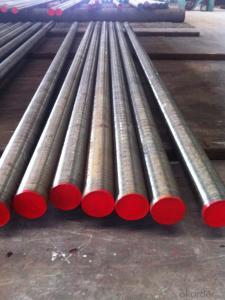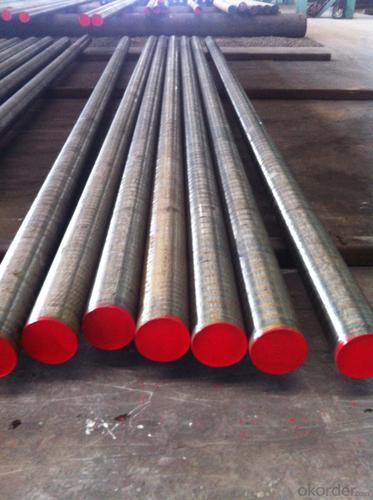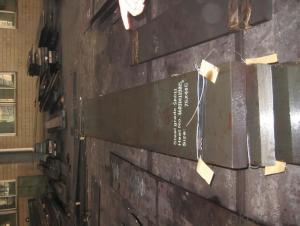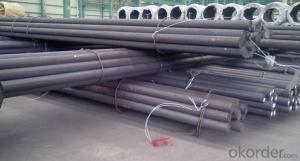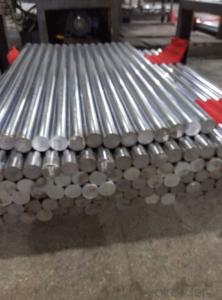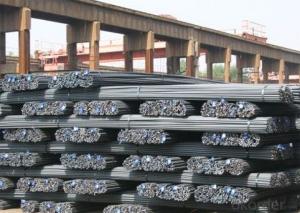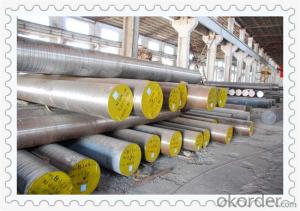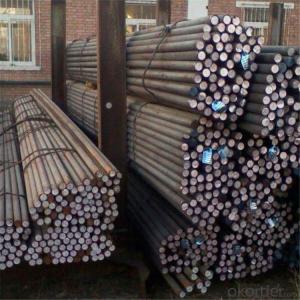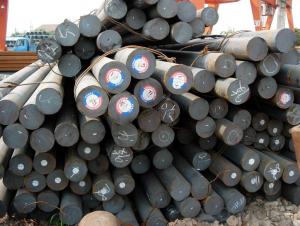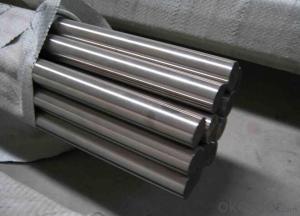42CrMo Hot Rolled Alloy Round Bar 95-280mm
- Loading Port:
- Shanghai
- Payment Terms:
- TT OR LC
- Min Order Qty:
- 300 m.t.
- Supply Capability:
- 2000 m.t./month
OKorder Service Pledge
OKorder Financial Service
You Might Also Like
Specification
Quick Information
· Place of Origin:China
· Application :Structural Steel Bar
· Dimensions :95mm to 280mm
· Steel Grade :42CrMo
· Technique :Hot Rolled
· Type :Alloy Steel Bar
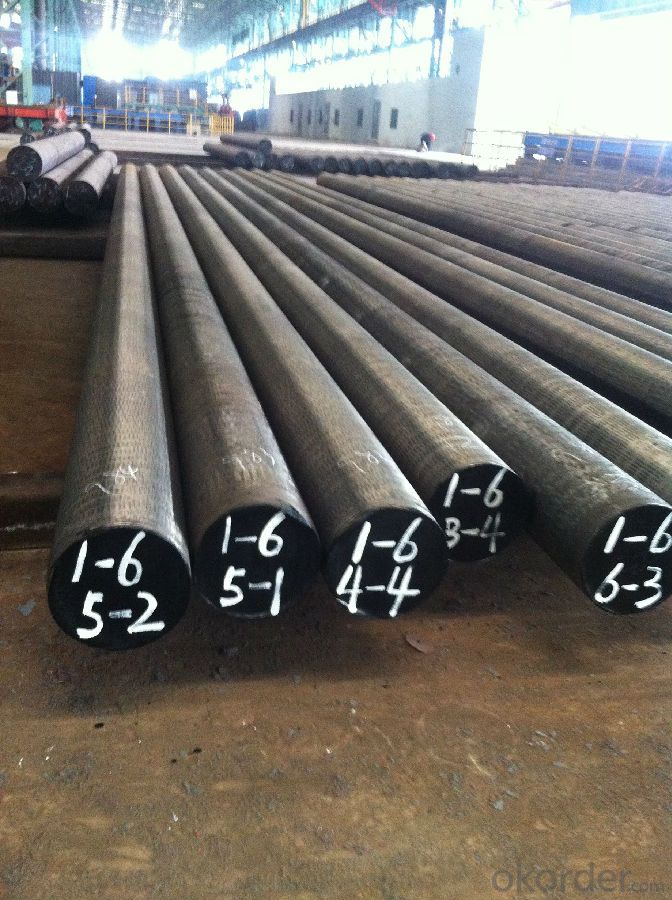
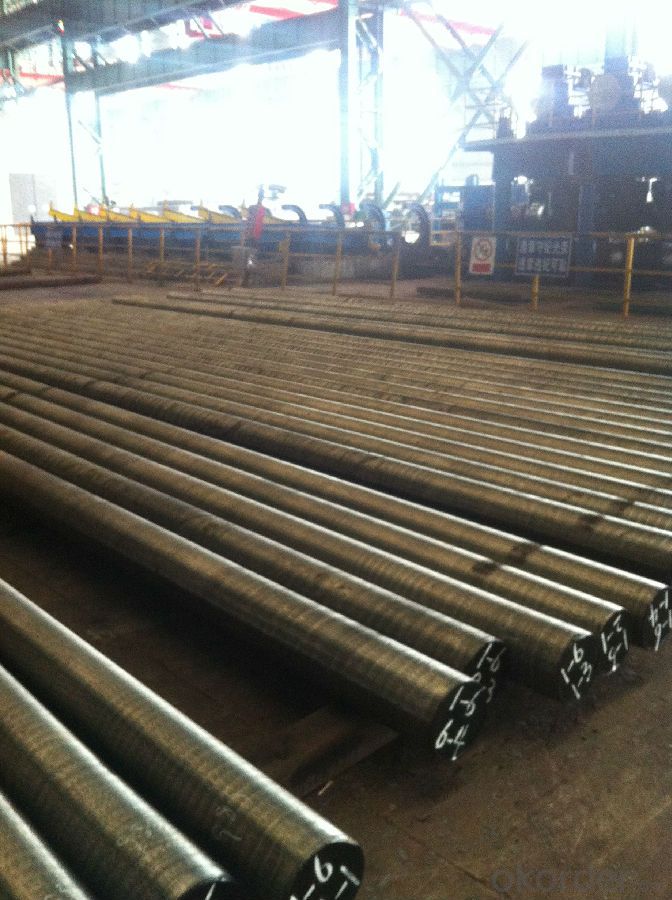
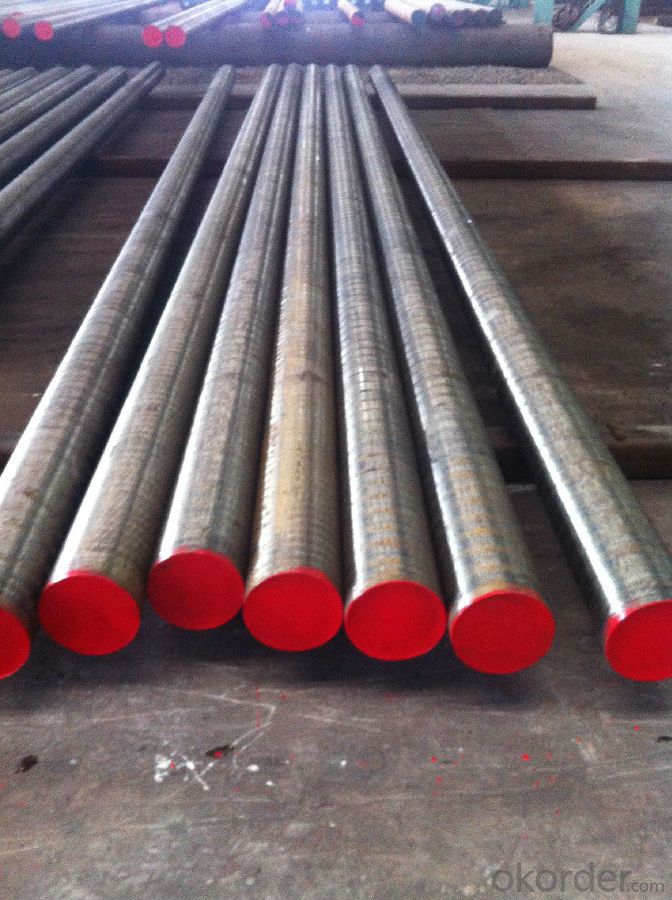
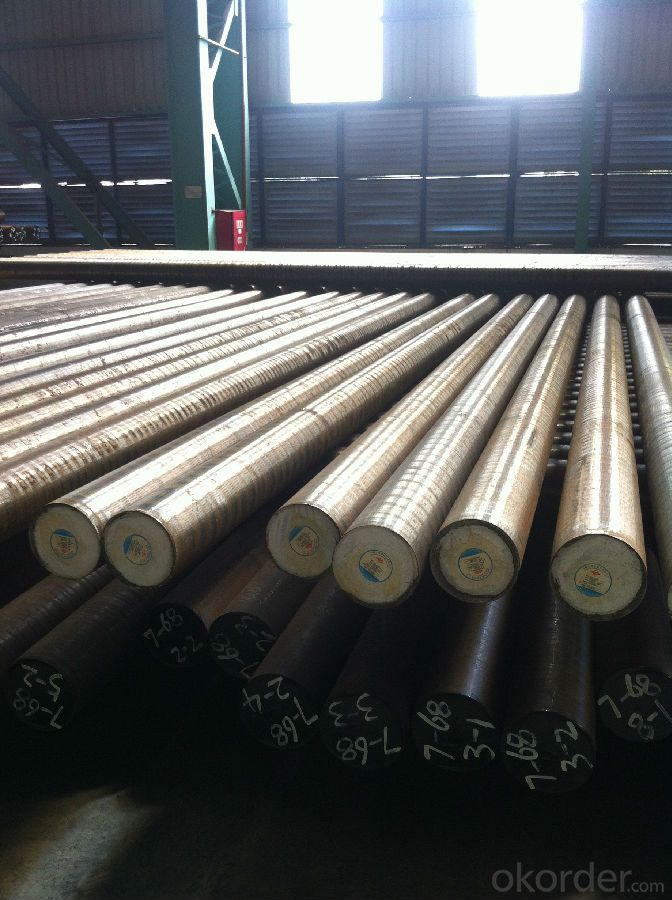
Product
Annual output of 1.1 million tons of steel including 800 thousand tons of continuous casting round bloom and 200 thousand tons of heavy ingot, and annual output of 750 thousand tons of hot rolled products.
Products, mainly including: railway wheel and tyre steel, bearing steel, spring steel, gear steel, tool and die steel, alloy tube billet, high quality ring steel, high grade cold heading steel, non-quenched and tempered steel, anchor chain steel, roller steel, steel for heavy castings and forgings, alloy structural steel and other series,are widely used in railway, energy, autos, machinery, construction, petroleum, chemical industry, metallurgy, aerospace, marine and other fields.
Chemical composition
C :0.38~0.45%
Si:0.17~0.37%
Mn:0.50~0.80%
S :≤0.035%
P :≤0.035%
Cr:0.90~1.20%
Ni:≤0.030%
Cu:≤0.030%
Mo:0.15~0.25%
Features of this kind of material
1) High fatigue strength and impact resistance after tempering
2) Good low-temperature impact toughness
3) No obvious temper brittleness
Size: Diameter 95mm-280mm
Length: 4m-12m
Delievery condition:
1.Both end of each bar must be cut.
2.Ladle furnaced and vacuum de-gassed
3.Show Heat No. on each bar
4.Surface condition: The surface of the bar shall be free cracks, scar and wrinkles at affect the use of the billets.
5.The mill test certificate shall show the chemical composition, and it is guaranteed that the chemical composition shall be within the limit stipulated in the contract.
- Q: What is the importance of heat treatment in special steel?
- Heat treatment is of utmost importance in special steel because it significantly enhances its mechanical properties and overall performance. Special steel, also known as alloy steel, is specifically designed to possess specific characteristics such as high strength, hardness, wear resistance, and toughness, making it suitable for demanding applications in industries like automotive, aerospace, and tooling. The heat treatment process involves controlled heating and cooling of the steel to alter its microstructure, which in turn affects its properties. There are several heat treatment techniques employed, including annealing, tempering, quenching, and hardening, each serving a specific purpose. One key importance of heat treatment in special steel is the ability to increase its hardness. Through techniques like quenching and hardening, the steel can be transformed into a hardened state, where it becomes much stronger and more resistant to abrasion and wear. This is crucial for applications that involve heavy loads, impact, and abrasive environments. Additionally, heat treatment can also improve the toughness and ductility of special steel. By carefully controlling the cooling rate during the heat treatment process, the steel's microstructure can be adjusted to achieve a fine-grained structure, enhancing its toughness and ability to withstand sudden impacts or shocks. This is particularly important in applications where the material needs to absorb energy and resist fractures, such as in structural components or tools. Furthermore, heat treatment can also improve the machinability and dimensional stability of special steel. By subjecting the steel to annealing or tempering processes, internal stresses and residual strains can be relieved, resulting in a more stable and easier-to-machine material. This is crucial in industries where precision and dimensional accuracy are paramount. In conclusion, the importance of heat treatment in special steel cannot be overstated. It is a vital process that allows for the optimization of the steel's mechanical properties, ensuring it meets the specific requirements of demanding applications. By carefully manipulating the microstructure, heat treatment enhances the steel's hardness, toughness, and machinability, making it a versatile and reliable material in various industries.
- Q: How is special steel used in the production of cutting blades?
- Special steel is used in the production of cutting blades due to its exceptional hardness, durability, and resistance to wear. This type of steel is specifically designed to withstand the high levels of stress and heat generated during cutting processes. It allows the blades to retain their sharpness for a longer period, resulting in improved cutting performance and longer lifespan. Additionally, special steel can be tailored to meet specific requirements, such as corrosion resistance or high impact strength, making it a preferred choice for various cutting applications.
- Q: What are the factors affecting the cost of special steel?
- The cost of special steel can be influenced by various factors. The price of raw materials is one of the primary factors. Special steel often requires specific alloys or additives, which can be expensive to obtain. Any fluctuations in the prices of these raw materials can directly affect the final product's cost. Another factor is the complexity of the manufacturing process. Advanced techniques and machinery are often used to produce special steel, and acquiring and maintaining them can be costly. The more intricate and specialized the manufacturing process, the higher the steel's cost. The demand and supply dynamics also play a role in determining the cost of special steel. If there is high demand but limited supply, the price is likely to go up. Conversely, if there is low demand and excessive supply, the price may decrease. Moreover, the level of customization required for the special steel can impact its cost. If a customer needs specific dimensions, tolerances, or surface finishes, additional processing steps may be necessary, leading to higher costs. Furthermore, transportation and logistics costs can affect the overall cost of special steel. If the steel needs to be transported over long distances or requires specialized handling, these additional expenses can accumulate. Lastly, market conditions and economic factors can influence the cost of special steel. Inflation, currency exchange rates, and overall economic stability can all have an impact on the pricing of special steel. In conclusion, the cost of special steel is determined by a combination of factors, including raw material costs, manufacturing complexity, demand and supply dynamics, customization requirements, transportation and logistics costs, and market conditions.
- Q: How does special steel contribute to the power generation equipment industry?
- Enhanced performance, durability, and reliability are crucial contributions of special steel to the power generation equipment industry. Turbines, generators, and transformers, which operate in harsh conditions characterized by high temperatures, pressure, and corrosive environments, benefit from the unique properties and characteristics of special steel. An advantage of special steel in power generation equipment lies in its capacity to withstand high temperatures. Heat-resistant steel alloys, explicitly designed for extreme conditions, enable power plants to function efficiently and safely at elevated temperatures. These steels maintain their strength, structural integrity, and resistance to creep and fatigue even under the highest operating temperatures, guaranteeing the reliability and longevity of the equipment. Moreover, special steel exhibits excellent corrosion resistance, a critical feature for power generation equipment due to the presence of corrosive elements like water, steam, and chemicals. Stainless steel, in particular, is highly utilized in power plants thanks to its remarkable corrosion resistance, preventing equipment degradation and reducing maintenance costs. By employing special steel, power generation companies can minimize downtime and improve overall efficiency. Furthermore, special steel contributes significantly to the power generation equipment industry by providing exceptional strength and mechanical properties. This is especially crucial for large-scale equipment like turbines and generators, which face high mechanical loads. High-strength special steel allows these components to withstand stress and pressure, ensuring their safe and reliable operation over extended periods. Additionally, special steel's unique properties, such as high hardness and wear resistance, make it suitable for critical components like blades and rotors, minimizing the risk of failure and enhancing overall performance. In conclusion, special steel is an indispensable material within the power generation equipment industry. Its ability to endure high temperatures, resist corrosion, and provide exceptional strength and mechanical properties ensures the reliability, durability, and efficiency of power plants. Through the utilization of special steel, power generation companies can enhance equipment performance and reduce maintenance costs, ultimately contributing to the sustainable and dependable production of electricity.
- Q: How does special steel contribute to the defense aerospace industry?
- Special steel plays a critical role in the defense aerospace industry by providing the necessary strength, durability, and resistance to extreme conditions that are essential for the design and production of military aircraft and defense systems. One of the key contributions of special steel is its ability to withstand high temperatures and pressures, making it suitable for the construction of engine components such as turbine blades, exhaust systems, and combustion chambers. These parts are subjected to intense heat and stress during operation, and special steel ensures they can withstand these extreme conditions without compromising performance or safety. Furthermore, special steel is utilized in the manufacturing of structural components in military aircraft, such as landing gear, wings, and fuselage sections. These components need to possess exceptional strength and toughness to withstand the harsh conditions encountered during flight and combat operations. Special steel provides the necessary mechanical properties to ensure these components can withstand the forces and impacts they may experience. Another crucial aspect where special steel contributes to the defense aerospace industry is its corrosion resistance. Military aircraft are often exposed to harsh environments, including saltwater and corrosive chemicals. Special steel, through the addition of corrosion-resistant alloys, helps protect critical parts from corrosion, ensuring the longevity and reliability of the aircraft. Moreover, special steel's high strength-to-weight ratio allows for the production of lightweight yet robust components in defense aerospace applications. This characteristic is highly desirable in the aerospace industry as it enables the design of aircraft that are more fuel-efficient, faster, and capable of carrying higher payloads. By reducing weight, special steel contributes to the overall performance and efficiency of military aircraft. In conclusion, special steel is an indispensable material in the defense aerospace industry. Its unique properties, such as high temperature resistance, strength, corrosion resistance, and lightweight characteristics, enable the production of reliable, high-performance military aircraft and defense systems. Special steel plays a crucial role in ensuring the safety, efficiency, and effectiveness of the defense aerospace industry.
- Q: Can special steel be used in the production of bearings?
- Yes, special steel can be used in the production of bearings. Special steel alloys such as stainless steel or high-carbon chromium steel are often used to manufacture bearings due to their superior strength, durability, and corrosion resistance properties. These specialized steels ensure that bearings can withstand heavy loads, high temperatures, and harsh operating conditions, making them suitable for various industries, including automotive, aerospace, and manufacturing.
- Q: What are the main factors affecting the creep rupture strength of special steel?
- The main factors affecting the creep rupture strength of special steel are the material composition, grain size, temperature, applied stress, and time.
- Q: What are the requirements for special steel used in transportation infrastructure?
- Special steel used in transportation infrastructure must meet certain requirements to ensure its durability, strength, and resistance to various environmental factors. Some of the key requirements for special steel in transportation infrastructure include: 1. High Strength: Special steel used in transportation infrastructure must have high tensile strength to withstand heavy loads and stresses. It should be able to resist deformation and maintain its structural integrity under significant pressure. 2. Corrosion Resistance: Transportation infrastructure is often exposed to harsh weather conditions, including rain, humidity, and saltwater. Special steel must have excellent corrosion resistance to prevent rusting and deterioration over time. This is particularly important for bridges, tunnels, and railway tracks located near coastal areas. 3. Fatigue Resistance: Transportation infrastructure experiences repetitive and cyclic loading, which can lead to fatigue failure if the steel used is not resistant to this type of stress. Special steel should have good fatigue resistance properties to prevent cracking and failure due to repeated loading. 4. Weldability: Special steel used in transportation infrastructure should have good weldability to facilitate construction and repairs. It should be easily weldable without compromising its strength and performance. 5. Impact Resistance: Transportation infrastructure, such as guardrails and crash barriers, is subjected to impact loads from vehicles. Special steel should possess excellent impact resistance to absorb and distribute the energy from impacts, reducing the risk of catastrophic failure. 6. Fire Resistance: In the event of a fire, special steel used in transportation infrastructure should have a high melting point and retain its structural integrity for a reasonable amount of time. This is crucial for ensuring the safety of passengers and minimizing the damage caused by fire incidents. 7. Low Maintenance: For cost-effectiveness and long-term sustainability, special steel used in transportation infrastructure should require minimal maintenance. It should have a long service life and minimal need for repainting, repair, or replacement. Meeting these requirements ensures that the special steel used in transportation infrastructure can provide a safe, reliable, and durable foundation for roads, bridges, railway tracks, and other critical components of the transportation network.
- Q: What industries commonly use special steel?
- Special steel, known as alloy steel as well, finds extensive use in diverse industries owing to its exceptional properties and performance characteristics. Several industries frequently employ special steel, including: 1. Automotive Industry: Special steel is extensively utilized in manufacturing automobile components such as crankshafts, camshafts, gears, and axles. Its exceptional strength, durability, and excellent heat resistance make it suitable for enduring the demanding conditions of the automotive sector. 2. Aerospace Industry: The aerospace industry relies on special steel to manufacture critical components like turbine blades, landing gear, and structural parts. Its ability to withstand high temperatures and maintain structural integrity under extreme conditions is vital for aerospace applications. 3. Oil and Gas Industry: In the oil and gas sector, special steel is crucial for applications like drill bits, valves, pipelines, and offshore platform components. Its corrosion resistance, high strength, and ability to withstand extreme temperatures and pressures make it suitable for these challenging environments. 4. Construction Industry: Special steel serves the construction industry in fabricating structural components, reinforcement bars, and high-rise building frameworks. Its high tensile strength, toughness, and resistance to wear and tear ensure the safety and stability of the structures. 5. Tool and Die Industry: The tool and die sector widely employs special steel in manufacturing cutting tools, molds, dies, and various machine components. Its capability to retain sharpness, resist deformation, and withstand high pressures and temperatures make it indispensable for these applications. 6. Energy Industry: Power generation plants, including nuclear, thermal, and renewable energy facilities, extensively utilize special steel. It is employed in manufacturing turbines, boilers, heat exchangers, and other critical components, thanks to its high temperature and corrosion resistance properties. 7. Medical Industry: In the medical field, special steel plays a crucial role, particularly in surgical instruments and implants. Its biocompatibility, strength, and corrosion resistance make it suitable for applications like joint replacements, dental instruments, and surgical cutting tools. 8. Manufacturing Industry: Various manufacturing processes like machining, forging, and casting widely rely on special steel. It is employed in the production of machine tools, industrial equipment, and heavy machinery components due to its high strength, toughness, and versatility. These examples represent just a fraction of the industries that commonly employ special steel. Its unique properties make it an indispensable material for a wide range of applications where strength, durability, heat resistance, and corrosion resistance are critical factors.
- Q: How does alloy steel improve the strength and toughness of steel?
- Alloy steel improves the strength and toughness of steel by introducing additional elements, such as chromium, nickel, or manganese, which alter the microstructure and properties of the material. These alloying elements form solid solutions, precipitates, or carbides, which strengthen the steel by hindering dislocation movement and grain growth. The resulting steel exhibits higher tensile strength, better resistance to wear, improved hardness, and increased toughness, making it suitable for various demanding applications.
Send your message to us
42CrMo Hot Rolled Alloy Round Bar 95-280mm
- Loading Port:
- Shanghai
- Payment Terms:
- TT OR LC
- Min Order Qty:
- 300 m.t.
- Supply Capability:
- 2000 m.t./month
OKorder Service Pledge
OKorder Financial Service
Similar products
Hot products
Hot Searches
Related keywords
